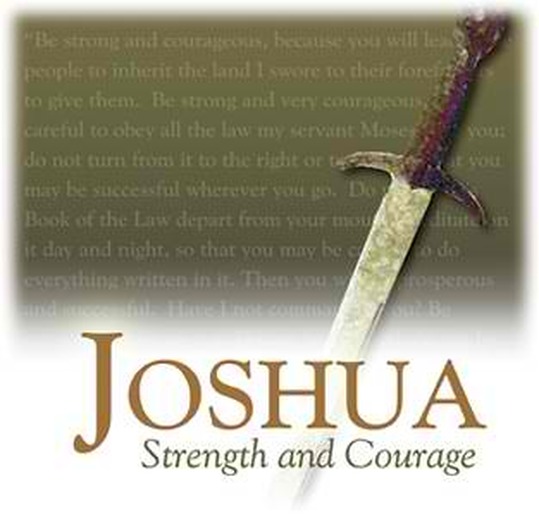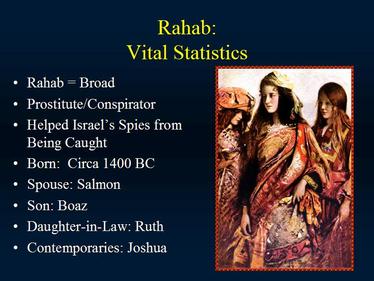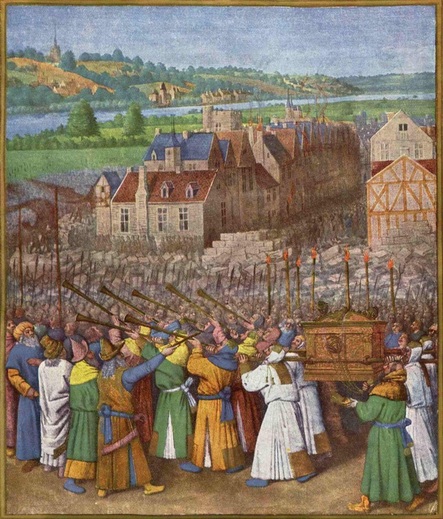The Book of Joshua

This book is named after its leading character, Joshua (meaning Jehovah is salvation), whom God named as Israel's leader before Moses' death. The Greek form of Joshua is Jesus. Where Deuteronomy ends the book of Joshua begins, with the tribes still camped on the east side of the Jordan River. The majority was written by Joshua. The theme of the book is the establishment of Israel in the promised land. With God's help the people crossed the Jordan River and took possession of all the main areas of Canaan. Toward the end of the book Joshua reminded the people of God's covenant promises to them and instructed them to keep on loving and obeying God.
I. Preparation for Possession of Canaan (1:1-5:12)
II. The Conquest of Canaan (5:13-12:24)
III. The Division of Land by Tribes (13:1-21:45)
IV. Farewell and Death of Joshua (22:1-24:33)
I. Preparation for Possession of Canaan (1:1-5:12)
II. The Conquest of Canaan (5:13-12:24)
III. The Division of Land by Tribes (13:1-21:45)
IV. Farewell and Death of Joshua (22:1-24:33)

In chapters 1-4, Joshua and the Israelites enter the promise land with an amazing entry. As they arrive at the Jordan River, we find details of an incredible, miraculous crossing. God shows His incredible grace to a prostitute named Rahab, the ancestress of King David.

Then in chapters 5-12, Joshua follows God’s orders and first conquers the central of the promise land. This includes the unlikely manner in which they conquer the grand fortress of Jericho. God alone moved and conquered this impossible achievement. Ai was the next town and although it took two tries, the first due to sin in the camp, on the second attempt God again moved and dominated. Next, the Israelites occupied the southern land and then the northern land to complete the occupancy; however, although they controlled the region, they never did completely conquer it.

Finally, in chapters 13-24, the land is divided up and distributed among the tribes of Israel. Some of the larger cities are placed aside for the Levitical priests who did not receive a portion of land, due to their duties. Lastly, Joshua dies but before he passes he gives one of the greatest challenges that lasts for all generations including our own, “Choose for yourselves today
whom you will serve…as for me and my house, we will serve the LORD” (24:15).
Foreshadowing of Jesus
Israel Crosses the Jordan
Joshua 1:11- Joshua commands the people, "for within three days you are to cross this Jordan, to go in to possess the land which the Lord your God is giving you, to possess it."
Jesus was raised from the dead on the third day. In Acts 10:40, Luke tells us, "God raised Him up on the third day and granted that He become visible,"
The crossing of the Jordan was significant in that God's people could not turn back after crossing once the waters came back; the waters "stood and rose up in one heap" a great distance away at the city of Adam (Joshua 3:16). Notice this is the same chapter and verse as the most often quoted verse in the Bible, John 3:16.
The resurrection of Christ gave believers in Him the opportunity to be dead 'in Adam' and to be eternally alive 'in Christ'. Believers become a new creation in Christ (2 Corinthians 5:17). There would be no turning back - no crossing back over the river of Jordan.
God called Joshua to appoint 12 men. Jesus appointed 12 men to be His apostles. Joshua 4:4, "So Joshua called the twelve men whom he had appointed from the sons of Israel, one man from each tribe;" Luke 6:13
Memorial Stones from Jordan
Joshua 4:3-9, God is speaking to Joshua, "and command them, saying, 'Take up for yourselves twelve stones from here out of the middle of the Jordan, from the place where the priests' feet are standing firm, and carry them over with you and lay them down in the lodging place where you will lodge tonight.' " Joshua speaking to the 12... "Let this be a sign among you, so that when your children ask later, saying, 'What do these stones mean to you?' then you shall say to them, 'Because the waters of the Jordan were cut off before the ark of the covenant of the Lord; when it crossed the Jordan, the waters of the Jordan were cut off.' So these stones shall become a memorial to the sons of Israel forever."
Joshua 4:22-23, "then you shall inform your children, saying, 'Israel crossed this Jordan on dry ground.' For the Lord your God dried up the waters of the Jordan before you until you had crossed, just as the Lord your God had done to the Red Sea, which He dried up before us until we had crossed;"
The stones are a remembrance of the Lord. This is a shadow of communion when Jesus says in Luke 22:19, "Do this in remembrance of me." The stones bring focus to God and what He did (parting the Red Sea and the Jordan), taking the focus off the world. Communion is used in a similar way; it re-directs our focus to Jesus and what He did for us on the cross. A remembrance.
continue to Judges...
whom you will serve…as for me and my house, we will serve the LORD” (24:15).
Foreshadowing of Jesus
Israel Crosses the Jordan
Joshua 1:11- Joshua commands the people, "for within three days you are to cross this Jordan, to go in to possess the land which the Lord your God is giving you, to possess it."
Jesus was raised from the dead on the third day. In Acts 10:40, Luke tells us, "God raised Him up on the third day and granted that He become visible,"
The crossing of the Jordan was significant in that God's people could not turn back after crossing once the waters came back; the waters "stood and rose up in one heap" a great distance away at the city of Adam (Joshua 3:16). Notice this is the same chapter and verse as the most often quoted verse in the Bible, John 3:16.
The resurrection of Christ gave believers in Him the opportunity to be dead 'in Adam' and to be eternally alive 'in Christ'. Believers become a new creation in Christ (2 Corinthians 5:17). There would be no turning back - no crossing back over the river of Jordan.
God called Joshua to appoint 12 men. Jesus appointed 12 men to be His apostles. Joshua 4:4, "So Joshua called the twelve men whom he had appointed from the sons of Israel, one man from each tribe;" Luke 6:13
Memorial Stones from Jordan
Joshua 4:3-9, God is speaking to Joshua, "and command them, saying, 'Take up for yourselves twelve stones from here out of the middle of the Jordan, from the place where the priests' feet are standing firm, and carry them over with you and lay them down in the lodging place where you will lodge tonight.' " Joshua speaking to the 12... "Let this be a sign among you, so that when your children ask later, saying, 'What do these stones mean to you?' then you shall say to them, 'Because the waters of the Jordan were cut off before the ark of the covenant of the Lord; when it crossed the Jordan, the waters of the Jordan were cut off.' So these stones shall become a memorial to the sons of Israel forever."
Joshua 4:22-23, "then you shall inform your children, saying, 'Israel crossed this Jordan on dry ground.' For the Lord your God dried up the waters of the Jordan before you until you had crossed, just as the Lord your God had done to the Red Sea, which He dried up before us until we had crossed;"
The stones are a remembrance of the Lord. This is a shadow of communion when Jesus says in Luke 22:19, "Do this in remembrance of me." The stones bring focus to God and what He did (parting the Red Sea and the Jordan), taking the focus off the world. Communion is used in a similar way; it re-directs our focus to Jesus and what He did for us on the cross. A remembrance.
continue to Judges...